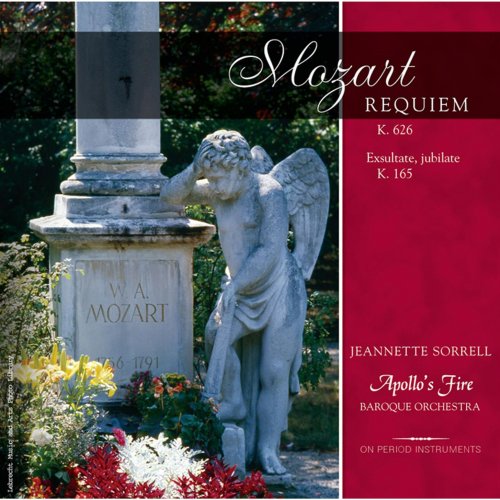Apollo's Fire; Jeannette Sorrell - Mozart: Requiem; Exsultate Jubilate (2006)

Artist: Apollo's Fire, Jeannette Sorrell
Title: Mozart: Requiem; Exsultate Jubilate
Year Of Release: 2006
Label: eOne Music International Classics / KOCH INT'L. CLASSICS
Genre: Classical
Quality: FLAC (tracks)
Total Time: 55:50 min
Total Size: 247 MB
WebSite: Album Preview
Tracklist:Title: Mozart: Requiem; Exsultate Jubilate
Year Of Release: 2006
Label: eOne Music International Classics / KOCH INT'L. CLASSICS
Genre: Classical
Quality: FLAC (tracks)
Total Time: 55:50 min
Total Size: 247 MB
WebSite: Album Preview
1. Mozart Requiem: Introit
2. Mozart Requiem: Kyrie
3. Mozart Requiem: Dies Irae
4. Mozart Requiem: Tuba Mirum
5. Mozart Requiem: Rex Tremendae
6. Mozart Requiem: Recordare
7. Mozart Requiem: Confutatis
8. Mozart Requiem: Lacrimosa
9. Mozart Requiem: Domine Jesu
10. Mozart Requiem: Hostias
11. Mozart Requiem: Agnus Dei
12. Mozart Requiem: Communion
13. Mozart Exultate, Jubilate: Allegro
14. Mozart Exultate, Jubilate: Recitative
15. Mozart Exultate, Jubilate: Andante
16. Mozart Exultate, Jubilate: Molto Allegro
This disc evokes the early days of the historical-performance movement. The singers on this disc by the Cleveland-based group Apollo's Fire don't match the all-professional choirs heard in recordings by Europe's best groups. But neither were the original performers of Mozart's Requiem well-trained professionals, in all likelihood -- the work was commissioned by an Austrian count named Walsegg with the intention of passing it off as his own work at a musicale held at his home. (Which shows just how seriously Enlightenment-era Vienna took its Catholicism, by the way.) Apollo's Fire combines precise playing from a moderate-sized period-instrument band with a big choir that has to be reined in and quieted down in the work's many contrapuntal passages in order to realize the conductor's intentions. Sample the fugue from the Kyrie, repeated at the end of the work (supposedly as per Mozart's instructions), for an idea of the sound of this performance. Other distinctive features of this recording include the omission of the Sanctus and Benedictus composed by Franz Xaver Süssmayr after Mozart's death, as well as a new and very effective completion of the "Lacrymosa," for which Mozart wrote only eight measures, by contemporary composer René Schiffer. Trusting a smaller choir to produce the desired effect might have produced a more natural sound and given the soloists room to breathe. And the motet Exsultate, jubilate, K. 165, from soprano Cyndia Sieden, that fills out the disc adds little to what has been accomplished by previous readings of that soprano showpiece. Still, this recording is well worth the attention of those fascinated by the twists and turns of the Requiem's long reception history. With all the versions of the work available it might seem hard to offer a distinctive interpretation, but Apollo's Fire has done just that.

![Tim Kliphuis, Maya Fridman, Marc van Roon - Kosmos (2025) [Hi-Res] Tim Kliphuis, Maya Fridman, Marc van Roon - Kosmos (2025) [Hi-Res]](https://www.dibpic.com/uploads/posts/2025-12/1765893448_folder.jpg)


![Tomasz Stanko - Unit (Polish Radio Sessions vol. 2/6) (2025) [Hi-Res] Tomasz Stanko - Unit (Polish Radio Sessions vol. 2/6) (2025) [Hi-Res]](https://www.dibpic.com/uploads/posts/2025-12/1765796826_cover.jpg)



![Tomasz Stańko - Rue de la Tour (Polish Radio Sessions vol. 5/6) (2025) [Hi-Res] Tomasz Stańko - Rue de la Tour (Polish Radio Sessions vol. 5/6) (2025) [Hi-Res]](https://www.dibpic.com/uploads/posts/2025-12/1765796463_cover.jpg)